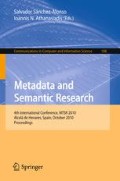Abstract
This article discusses the benefits and future of standards and presents the generic multi-dimensional Reference Model. First the importance and the tasks of interoperability as well as quality development and their relationship are analyzed. Especially in e-Learning their connection and interdependence is evident: Interoperability is one basic requirement for quality development. In this paper, it is shown how standards and specifications are supporting these crucial issues. The upcoming ISO metadata standard MLR (Metadata for Learning Resource) will be introduced and used as example for identifying the requirements and needs for future standardization. In conclusion a vision of the challenges and potentials for e-Learning standardization is outlined.
Access this chapter
Tax calculation will be finalised at checkout
Purchases are for personal use only
Preview
Unable to display preview. Download preview PDF.
References
Luhmann, N.: The Society of the Society. Die Gesellschaft der Gesellschaft. Suhrkamp Frankfurt/ Main (1998)
Maturana, H.R., Varela, F.J.: The Tree of Knowledge. The Biological Roots of Understanding. Shambhala, Boston (1992)
Luhmann, N.: Social Systems. Stanford University Press, Stanford (1995)
Stracke, C.M.: Interoperability and Quality Development in e-Learning. Overview and Reference Model for e-Learning Standards. In: Proceedings of the Asia-Europe e-Learning Colloquy. e-ASEM, Seoul (2006), http://www.qed-info.de/downloads
Donabedian, A.: The Definition of Quality and Approaches to Its Assessment. Explorations in Quality Assessment and Monitoring, vol. 1. Health Administration Press, Ann Arbor (1980)
Deming, W.E.: Quality, productivity and competitive position. MIT, Cambridge (1982)
Juran, J. (ed.): Quality Control Handbook. McGraw-Hill, New York (1951)
Stracke, C.M.: Quality Development and Standards in e-Learning: Benefits and Guidelines for Implementations. In: Proceedings of the ASEM Lifelong Learning Conference: e-Learning and Workplace Learning. ASEM, Bangkok (2009), http://www.qed-info.de/downloads
SC36: SC36 Terms of Reference (2002), http://sc36.org or http://www.iso.org/jtc1/sc36 (retrieved October 28, 2006)
ISO/IEC 19796-1:2005: Information Technology - Learning, Education, and Training — Quality Management, Assurance and Metrics — Part 1: General Approach. International Organization for Standardization (ISO), Geneva (2005)
Stracke, C.M.: Quality and Standards in Learning, Education, and Training: The Adaptation Model IDEA for the Introduction of Quality Development. In: Proceedings of the International Conference on the Past and Future of e-Learning Standards, Toyo, Tokyo (2010), http://www.qed-info.de/downloads
ISO/IEC 19788-1:2010: Information Technology - Learning, Education, and Training — Metadata for Learning Resources — Part 1: Framework. International Organization for Standardization (ISO), Geneva (in print, 2010)
PAS 1093: Human Resource Development with special consideration of Learning, Education and Training – Competence Modelling in Human Resource Development. DIN, Berlin (2009), http://www.qed-info.de/downloads
Author information
Authors and Affiliations
Editor information
Editors and Affiliations
Rights and permissions
Copyright information
© 2010 Springer-Verlag Berlin Heidelberg
About this paper
Cite this paper
Stracke, C.M. (2010). The Benefits and Future of Standards: Metadata and Beyond. In: Sánchez-Alonso, S., Athanasiadis, I.N. (eds) Metadata and Semantic Research. MTSR 2010. Communications in Computer and Information Science, vol 108. Springer, Berlin, Heidelberg. https://doi.org/10.1007/978-3-642-16552-8_32
Download citation
DOI: https://doi.org/10.1007/978-3-642-16552-8_32
Publisher Name: Springer, Berlin, Heidelberg
Print ISBN: 978-3-642-16551-1
Online ISBN: 978-3-642-16552-8
eBook Packages: Computer ScienceComputer Science (R0)

